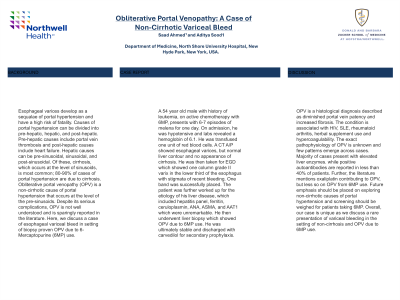Sunday Poster Session
Category: Liver
P1433 - Obliterative Portal Venopathy: A Case of Non-Cirrhotic Variceal Bleed
Sunday, October 27, 2024
3:30 PM - 7:00 PM ET
Location: Exhibit Hall E

Has Audio
- SA
Saad Ahmed, MD
Northwell Health-NSLIJ
Manhasset, NY
Presenting Author(s)
Saad Ahmed, MD, Aditya Sood, MD
Northwell Health-NSLIJ, Manhasset, NY
Introduction: Esophageal varices develop as a sequalae of portal hypertension and have a high risk of fatality. Causes of portal hypertension can be divided into pre-hepatic, hepatic, and post-hepatic. Pre-hepatic causes include portal vein thrombosis and post-hepatic causes include heart failure. Hepatic causes can be pre-sinusoidal, sinusoidal, and post-sinusoidal. Of these, cirrhosis, which occurs at the level of sinusoids, is most common; 80-90% of cases of portal hypertension are due to cirrhosis. Obliterative portal venopathy (OPV) is a non-cirrhotic cause of portal hypertension that occurs at the level of the pre-sinusoids. Despite its serious complications, OPV is not well understood and is sparingly reported in the literature. Here, we discuss a case of esophageal variceal bleed in setting of biopsy proven OPV due to 6-Mercaptopurine (6MP) use.
Case Description/Methods: A 54 year old male with history of leukemia, on active chemotherapy with 6MP, presents with 6-7 episodes of melena for one day. On admission, he was hypotensive and labs revealed a hemoglobin of 6.1. He was transfused one unit of red blood cells. A CT A/P showed esophageal varices, but normal liver contour and no appearance of cirrhosis. He was then taken for EGD which showed one column grade II varix in the lower third of the esophagus with stigmata of recent bleeding. One band was successfully placed. The patient was further worked up for the etiology of his liver disease, which included hepatitis panel, ferritin, ceruloplasmin, ANA, ASMA, and AAT1 which were unremarkable. He then underwent liver biopsy which showed OPV due to 6MP use. He was ultimately stable and discharged with carvedilol for secondary prophylaxis.
Discussion: OPV is a histological diagnosis described as diminished portal vein patency and increased fibrosis. The condition is associated with HIV, SLE, rheumatoid arthritis, herbal supplement use and hypercoagulability. The exact pathophysiology of OPV is unknown and few patterns emerge across cases. Majority of cases present with elevated liver enzymes. while positive autoantibodies are reported in less than 40% of patients. Further, the literature mentions oxaliplatin contributing to OPV, but less so on OPV from 6MP use. Future emphasis should be placed on exploring non-cirrhotic causes of portal hypertension and screening should be weighed for patients taking 6MP. Overall, our case is unique as we discuss a rare presentation of variceal bleeding in the setting of non-cirrhosis and OPV due to 6MP use.
Disclosures:
Saad Ahmed, MD, Aditya Sood, MD. P1433 - Obliterative Portal Venopathy: A Case of Non-Cirrhotic Variceal Bleed, ACG 2024 Annual Scientific Meeting Abstracts. Philadelphia, PA: American College of Gastroenterology.
Northwell Health-NSLIJ, Manhasset, NY
Introduction: Esophageal varices develop as a sequalae of portal hypertension and have a high risk of fatality. Causes of portal hypertension can be divided into pre-hepatic, hepatic, and post-hepatic. Pre-hepatic causes include portal vein thrombosis and post-hepatic causes include heart failure. Hepatic causes can be pre-sinusoidal, sinusoidal, and post-sinusoidal. Of these, cirrhosis, which occurs at the level of sinusoids, is most common; 80-90% of cases of portal hypertension are due to cirrhosis. Obliterative portal venopathy (OPV) is a non-cirrhotic cause of portal hypertension that occurs at the level of the pre-sinusoids. Despite its serious complications, OPV is not well understood and is sparingly reported in the literature. Here, we discuss a case of esophageal variceal bleed in setting of biopsy proven OPV due to 6-Mercaptopurine (6MP) use.
Case Description/Methods: A 54 year old male with history of leukemia, on active chemotherapy with 6MP, presents with 6-7 episodes of melena for one day. On admission, he was hypotensive and labs revealed a hemoglobin of 6.1. He was transfused one unit of red blood cells. A CT A/P showed esophageal varices, but normal liver contour and no appearance of cirrhosis. He was then taken for EGD which showed one column grade II varix in the lower third of the esophagus with stigmata of recent bleeding. One band was successfully placed. The patient was further worked up for the etiology of his liver disease, which included hepatitis panel, ferritin, ceruloplasmin, ANA, ASMA, and AAT1 which were unremarkable. He then underwent liver biopsy which showed OPV due to 6MP use. He was ultimately stable and discharged with carvedilol for secondary prophylaxis.
Discussion: OPV is a histological diagnosis described as diminished portal vein patency and increased fibrosis. The condition is associated with HIV, SLE, rheumatoid arthritis, herbal supplement use and hypercoagulability. The exact pathophysiology of OPV is unknown and few patterns emerge across cases. Majority of cases present with elevated liver enzymes. while positive autoantibodies are reported in less than 40% of patients. Further, the literature mentions oxaliplatin contributing to OPV, but less so on OPV from 6MP use. Future emphasis should be placed on exploring non-cirrhotic causes of portal hypertension and screening should be weighed for patients taking 6MP. Overall, our case is unique as we discuss a rare presentation of variceal bleeding in the setting of non-cirrhosis and OPV due to 6MP use.
Disclosures:
Saad Ahmed indicated no relevant financial relationships.
Aditya Sood indicated no relevant financial relationships.
Saad Ahmed, MD, Aditya Sood, MD. P1433 - Obliterative Portal Venopathy: A Case of Non-Cirrhotic Variceal Bleed, ACG 2024 Annual Scientific Meeting Abstracts. Philadelphia, PA: American College of Gastroenterology.
